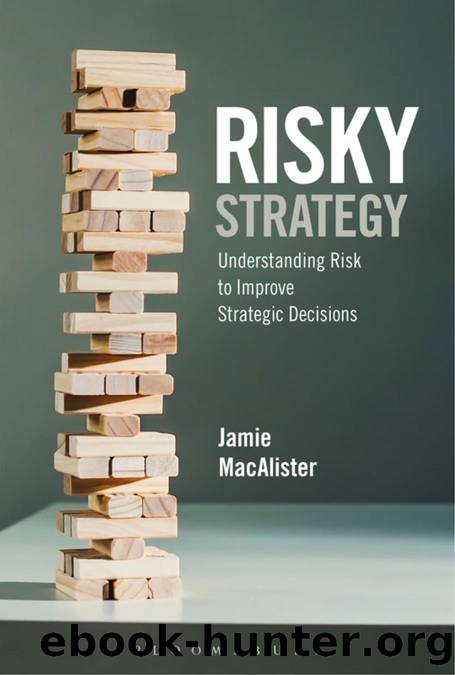Risky Strategy by MacAlister Jamie;

Author:MacAlister, Jamie;
Language: eng
Format: epub
Publisher: Bloomsbury Publishing Plc
Published: 2019-11-24T00:00:00+00:00
Lateral thinking
There is something about dissonance with beliefs that is picked up by the practice of lateral thinking, popularized by Edward de Bono (1999). What gets in the way of thinking laterally about problems are the subconscious assumptions that we make without realizing it. There are certain kinds of solutions that are naturally unavailable to us because we have already written them off.
In many of the cases I have just described, this is partly what is going on. In the Game Show Host problem, for example, there appears to be an underlying assumption that if I am now looking at the option of selecting one of two doors for the prize, my chances of getting it right with either selection is 50/50. How can what has happened already up to this point have any bearing on my odds now? Somehow, the past cannot be relevant.
For Smithburg at Quaker and the generals at Operation Market Garden, something different was happening. There is an underlying assumption that there is something inherent in previous successes which must be repeatable. There is a subconscious assumption that somehow there is no need to look too closely at a new set of variables, as why should they be any different from the previous set.
One of my favourite lateral thinking problems is the one where a man and his son are in a car accident. The man is killed, and the son is rushed to hospital. At the hospital, the surgeon announces, âI cannot operate on him because he is my sonâ. How can this be? Often people wrestle with all sorts of subtle explanations: the man came back to life; the surgeon is talking figuratively; itâs a dream, etc. There is a very simple explanation, which can make those whoâve missed it feel quite annoyed â the surgeon is of course his mother.
Why does this happen? Today, women are doing most jobs that men do, including being surgeons. And yet many people struggle with this particular scenario because at a subconscious level, they believe a surgeon must be male. The point is we are not being obstinate, and refusing to change our beliefs or assumptions, although this clearly does happen. We genuinely struggle to remain or become objective when making decisions about things where we cannot know everything there is to know.
I think this is what often happens with risk. We assume itâs about bad news, so we donât really want to talk about it; or somehow that exploring it might make it more likely to happen. Or we assume the opposite â that somehow bad things cannot happen to us. Either way, we are like ostriches with our heads in the sand, the idea being that if we donât look, then the bad thing wonât happen. Or we become like Teflon, convinced that nothing bad can stick to us. Either way we are elephants, and believe that ultimately analysis and sound thinking are the only valid ways to work with risk. Or we are tigers, and we believe that trusting our gut instinct is really the only honourable way to make decisions.
Download
This site does not store any files on its server. We only index and link to content provided by other sites. Please contact the content providers to delete copyright contents if any and email us, we'll remove relevant links or contents immediately.
| Corporate Finance | Crowdfunding |
| Financial Engineering | Financial Risk Management |
| Wealth Management |
The Black Swan by Nassim Nicholas Taleb(6851)
Bad Blood by John Carreyrou(6374)
Pioneering Portfolio Management by David F. Swensen(6130)
Millionaire: The Philanderer, Gambler, and Duelist Who Invented Modern Finance by Janet Gleeson(4194)
Skin in the Game by Nassim Nicholas Taleb(4055)
The Money Culture by Michael Lewis(3943)
Bullshit Jobs by David Graeber(3923)
Skin in the Game: Hidden Asymmetries in Daily Life by Nassim Nicholas Taleb(3807)
The Wisdom of Finance by Mihir Desai(3570)
Blockchain Basics by Daniel Drescher(3383)
Liar's Poker by Michael Lewis(3273)
The Intelligent Investor by Benjamin Graham Jason Zweig(2950)
Hands-On Machine Learning for Algorithmic Trading by Stefan Jansen(2940)
Mastering Bitcoin: Programming the Open Blockchain by Andreas M. Antonopoulos(2922)
Fooled by Randomness: The Hidden Role of Chance in Life and in the Markets by Nassim Nicholas Taleb(2920)
Investing For Dummies by Eric Tyson(2816)
The Power of Broke by Daymond John(2805)
Market Wizards by Jack D. Schwager(2571)
Zero Hour by Harry S. Dent Jr. & Andrew Pancholi(2550)
